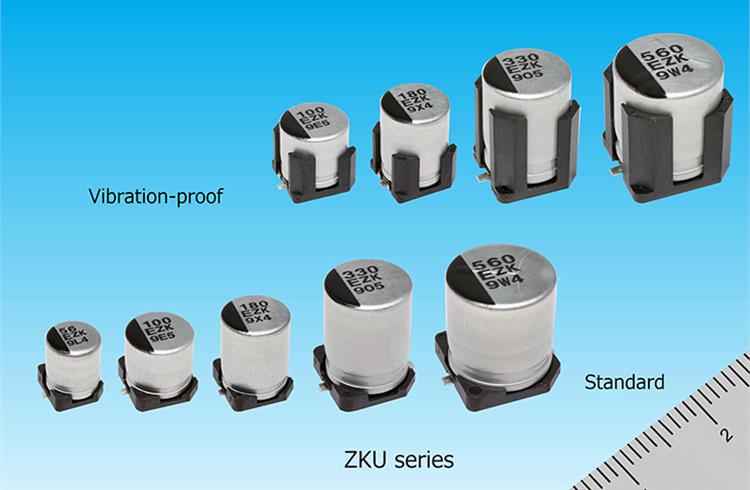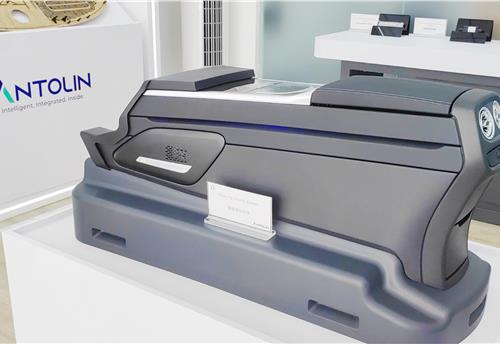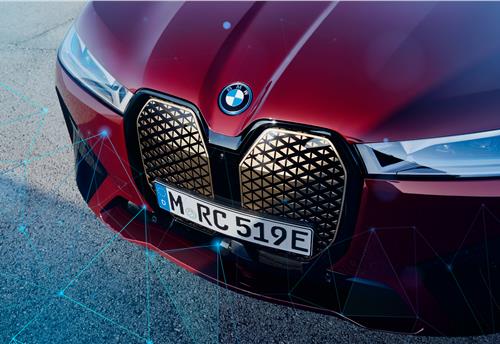Panasonic’s new capacitors to further downsize automotive ECUs
These capacitors are used in control circuits in automotive engine ECUs, BMSs, radiator fans and certain ADAS applications.
Panasonic Corporation announced that its 'Industrial Solutions' Company has commercialised the new ZKU series of large-capacitance conductive polymer hybrid aluminum electrolytic capacitors for use in automotive ECUs (electronic control units) and will launch mass production in August 2019. With increased capacitance, the largest product of this series with ϕ10 x 10.2 mm and smallest product with ϕ5 x 5.8 mm will respectively achieve reduction in the number of necessary capacitors and downsizing from the conventional standard products (ZC series), contributing to the downsizing of automotive ECUs.
Conductive polymer hybrid aluminum electrolytic capacitors feature low resistance and high reliability through the fusion of conductive polymer and electrolyte and are used in a wide range of applications, from control circuits in automotive engine ECUs, BMSs (battery management systems) to motor drive circuits in electric pumps, radiator fans, and further to ADAS applications (such as cameras, sensors, and control circuits).
The progress in the electrification of automobiles has led to redundant design aiming to improve the safety and reliability. As a result, more and more ECUs are used in a single car, due to the mounting of two identical ECUs, for example. Design for downsizing boards is necessary for securing mounting space, which requires reductions in the number and size of capacitors and large current.
To respond to these requirements, Panasonic has commercialised the ZKU series of conductive polymer hybrid aluminium electrolytic capacitors with what is said to be the industry's largest capacitance by using its electrode foil large-capacitance technology.
Panasonic's new conductive polymer hybrid aluminium electrolytic capacitors (ZKU Series) have the following features:
- These capacitors enable reductions in the number and size of capacitors necessary, contributing to board area reduction. The capacitors have achieved large capacitance, which is, 50 percent or more larger than the company's existing ZC series capacitors and 20 percent or more larger than the ZK series products.
- These capacitors maintain the large current and high reliability of the conventional products, contributing to board area reduction. The capacitors have achieved large currents, which is 1.3 times as much as those of the conventional ZC series products and equivalent to those of the ZK series. This enables a reduction in the number of required capacitors, from the use of several capacitors in parallel, as well as a reduction in the size of capacitors with the same rating, thereby contributing to board downsizing.
These capacitors is intended for voltage stabilisation at ECU power supply input sections (input filter), current stabilisation in motor drive circuits (DC-Link), and similar others.
RELATED ARTICLES
Antolin unveils sustainable tech solutions at Beijing Motor Show
In line with its China market roadmap, Antolin is showcasing its latest advances in lighting, HMI, electronics, and sust...
Visteon wins $1.4 billion in new business in Q1 2024, launches 26 new products
Digitisation of vehicle cockpit megatrend is a key growth driver for Visteon with over $400 million of displays wins; Vi...
BMW uses Catena-X ecosystem using real-world CO2 data to enhance quality
Working together with partners and suppliers, the company has modelled a complete data chain for the first time using re...





 By Autocar Pro News Desk
By Autocar Pro News Desk
 17 Jul 2019
17 Jul 2019
 5856 Views
5856 Views









